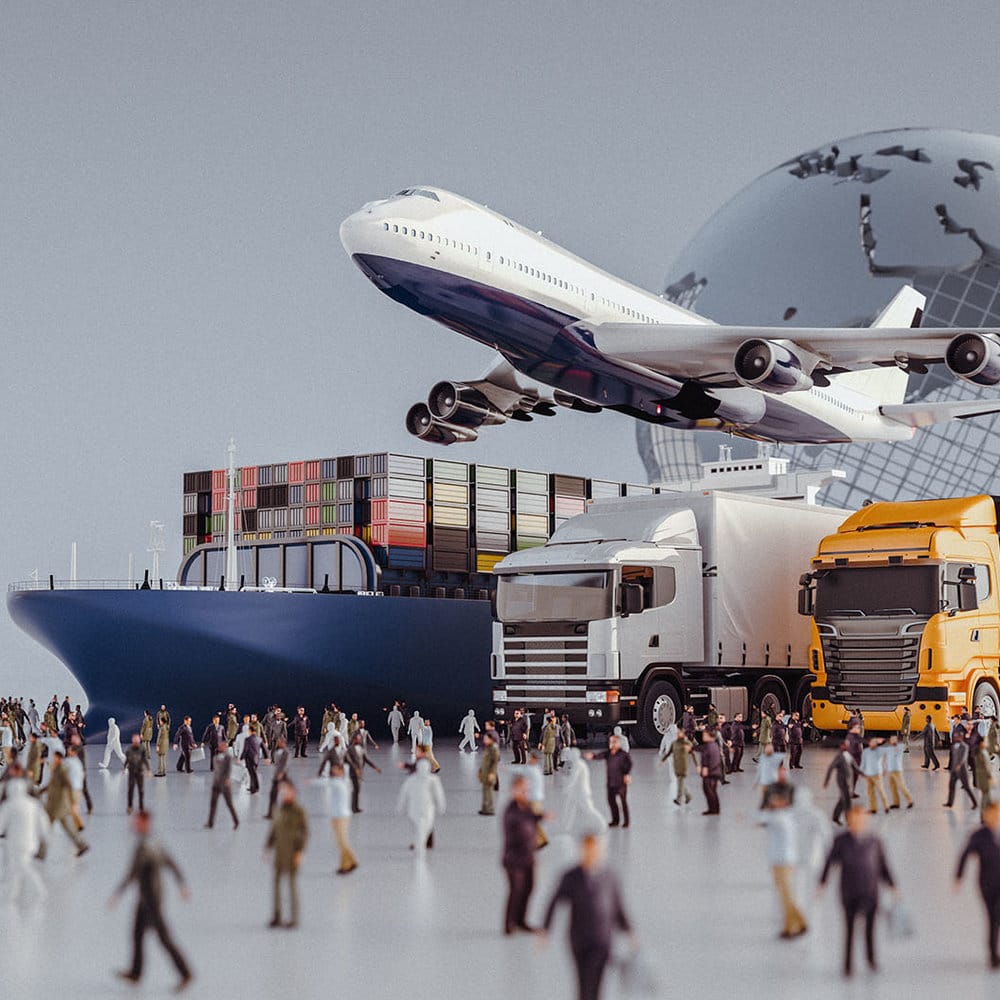The GTL research themes are designed to facilitate inter and multi-disciplinary research among all members of the group.
The themes are therefore not clusters of researchers but, rather, platforms to facilitate research interest and activity. Participation across the themes is therefore fluid and mostly informed by, and organised around, specific research projects and/or research engagement events. In whichever theme. The arrangement recognises that members’ research interests are varying and aims to foster broad collaboration. The research cuts across all the aspects of transport and logistics, including road, rail, maritime, warehousing and post.
Smart mobility

The nature of transport services is changing fast, powered by the increasing advancement of technology. Responding to increasing pressure, including consumer cost, urban congestion, environmental sustainability and the associated need for efficiency and safety in the movement of people and goods within urban setting and beyond, governments and transport providers have started exploring and implementing intelligent transport and mobility networks, capable of sustaining efficiency and productivity while meeting environmental, social and economic sustainability.
Researchers within this theme will develop and disseminate cutting-edge research aimed at increasing our understanding in the evolving smart mobility environment, including the new smart mobility technologies, the nature of transport and mobility services emerging and anticipated and challenges and opportunities for improved consumer experiences through smart technologies.
Theme leaders: Prof. Alem Mola, Dr Sophia Duan and Associate Prof. Richard Tay
Transport analytics

There is little doubt that data is key to business success and competitiveness. Unlike before, business organisations and beginning to understand how much value the data they have always collected and could collect holds. The challenge, however, is how to properly extract this value from the data; how to collect the right kind of data and how to effectively apply the data to enhance business productivity and profitability.
Transport and logistics operations rely greatly on data to understand and map transport demand patterns in order to develop services that are able to fulfil the just-in-time demands of customers and stakeholders. Many of these businesses however often struggle with the many of the key questions about data.
Our data analytics theme draws upon a pool of highly qualified and experienced researchers to work with industry partners in the transport and logistics sector on various innovative ways to collect, manage, analyse and apply data to drive business growth, productivity as well as enhance customer satisfaction.
Theme Leader: Prof. Babak Abbasi
Gender matters in transport and logistics work

Historically, the transport and logistics sector is heavily male-dominated and, although significant efforts have been taken and gains made, gender equality in the labour market and the workplace remains distant. Even in the 21st Century when it was expected that social progress and the advancement in the technologies of work would have converged to transform work and open up greater opportunities for women, women still form a small minority in the workforce and even smaller in executive and leadership positions.
Under this theme research will be developed to better understand the forces that sustain gender inequality in the sector, the challenges that it presents and how this undermines the potential of the sector to perform even better, and various ways and approaches of achieving gender equality.
An important aspect of the work under this theme is the active engagement with industry partners and other stakeholders, including government and workers unions. Through the various stakeholder engagement activities, active debate on these issues will be developed with the aim of influencing positive developments towards a more gender equal transport sector.
Theme Leader: Dr Aida Ghalebeigi
Connectivity and global transport networks

According to UNCTAD statistics, over 85 per cent of international trade, anywhere, is carried by sea. Even so, an important aspect of international trade is also over-land by rail and road, with the rest by air and coastal and river trade. In totality, from factory gate to warehouse and final consumer, there is a complex and delicate operation, involving several international routes, along different corridors and over an intricate combination of transport modes. How the roles of a wide variety of actors, facilities and institutions interact to ensure an efficient, safe, secure and timely logistics operations is subject to continuous study, aiming for even greater efficiencies and greater customer service.
The international transport situation has faced various challenges over the past few decades, including disruptions caused by global natural weather events and political conflicts, increasing pressure to reduce environmental pollution; transport activities being among the top five polluters and recently the Covid-19 pandemic and its impact on international commercial activities. On the other hand, there have been great opportunities in the form of new efficiency-enhancing and cost-saving technologies and increased improvement of international infrastructure development with major infrastructure initiatives like China’s belt and Road Initiative and the newly announced Blue Dot network.
In such a complex context a lot is left unknown, requiring continuous cutting-edge research. It is in this space that the Connectivity and Global Transport Networks works to investigate innovative ways of enhancing the efficiency, safety and productivity of international transport operations. The research is developed from various angles, including policy, management and operations.
Theme leaders: Associate Prof. Vinh Thai and Prof Prem Chhetri
Technological transformations and the future of work

The transport and logistics sector is often described as being at the cutting edge of technological transformation. Innovation in the technologies that enhance efficiency, productivity and safety is essential in the sector because of its essential and critical role in organising and servicing society. Yet, not a lot is known about the nature of technological change, the processes and decisions behind technology uptake and the wider implications beyond efficiency and productivity.
An important question about technology change is how, and the extent to which, it affects work, employment and workforce skills. Understanding how technology affects industry skills requirements is the critical step towards ensuring effective alignment between the production and supply of skills through the training system and the specific demand in industry. Furthermore, understanding how new technologies affect the nature of work and workers’ experience of work is important to ensure high productivity, efficiency and a motivated workforce.
Under this important theme, the researchers will work with industry partners to develop and disseminate cutting-edge research on various aspects of technological transformation in the sector but with the objective of informing policy and practice in relation to the opportunities and challenges for the future of work.
Theme leaders: Associate Prof, Darryn Snell and Professor Victor Gekara